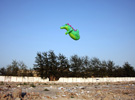Zhang: The theoretical positions in China have not yet discussed the language techniques of performance artists, the critics' analysis does not seem to go as deep as the artists' ones. It seems that there is some difficulty in analyzing performance art. It involves many common elements and practical understandings of the significance of randomness and uncertainty.
Zhou: I think what Chinese performance artists lack is not the idea, but the dispute with the basic language of performance art and progress. This has to be done attentively. It is a steady and straining work. In the last years, I participated in many international performance art festivals and got the feeling that performance art is in a mediocre phase right now. The new possibilities for performance artists are expanding. This is something that all artists in this field should be aware of.
Zhang: Let's talk a bit about your performances. In the last years your performances have followed a similar path: outside forces make your body lose control and you do the utmost to try to control your body. You explained that in this way of losing control of your body you try to properly communicate your thoughts.
Zhou: In my works I try to overcome the subjective controlling of the body, so losing control of the body is just the most effective way. The state of losing control in the art work is a set up after the rational thinking, with its intention to set a focus of the work’s concept, so there is still logic behind it. For example in the piece “One Yuan”, I have a coin between my teeth and force my mouth to stay open, naturally I start to drool, feel sick, shed tears etc. This is a natural reaction of the body and not acted. It expresses my doubts about the relationship between people and money.
Zhang: You like to challenge the limits of physiology. But in “30 Days Project” you repeatedly remind yourself of living a calm, regular, and simple life. You also say that you do not want to lose control over your life and body. You do not seek to “lose control”. Isn't that a big change in your work?
Zhou: Control allows a more creative “losing of control”. The “30 Days Project” is a fight for artistic creativity. Every day a new piece is produced, that is like a fight game for each person. I want to remind myself that by living a quiet, regular, simple life I can still have a creative mind. Just like a Buddhist monk practicing. The “30 Days Project” is logically not that different from my earlier projects but some of the works that come out of it definitely are. That is what I had hoped for. We talked about it earlier that before I started the project, I told myself to fully trust in my intuition and inner being, not use any fixed theories to analyze my works, but just take them as art as they evolved.
Zhang: I am especially interested in that status of yours when you put yourself in a plain, simple, and quiet surrounding, energy and wisdom is set free and creative freedom and self-confidence evolves. All forms and materials turn from traditional “performance” methods to multimedia use, from performing on a stage to going online, so your work enters a new and more open platform.
Zhou: In the “30 Days Project” I sealed myself off, maintained a quiet, regular and simple lifestyle and the more I took the time to talk to myself, the clearer became my inner emotions. I naturally dealt with my works, gradually observed every element and technique and continuously grew and extended. I was filled with indeterminate possibilities.
Zhang: Your works express a growing individual style: serenity, taciturnity, exactness, and deep thoughts. This tendency to quietly express important matters, is it a way for you to seek a higher level of basic language techniques?
Zhou: I rather respect the ideas of “Showing attitude without words”, “Great music has the faintest notes” and “Living the quiet extreme”. In my earlier works the visual is very direct and violent, now I tend to use more quiet ways to express my anger. And often this form of expression is much more piercing.
Zhang: “Great music has the faintest notes” is a state of unity between form and content. In fact you always looked for the connection between content and spiritual simpleness. In 1997 I went to an artistic event at the former site of the Sichuan Library, which is where I met you. At that time I thought you had come to Chengdu because of the lively performance art scene, later I found out that you actually came here because of your family, because of your newly born daughter. You left Beijing and Songzhuang because of your family and worked in a company to support your family financially. That is why in the late Nineties you were not very well known as an artist in Chengdu, do you sometimes regret this decision?
Zhou: There isn’t any sort of wide gap between creating art and real life. I’m infatuated with trivial everyday affairs. Things like drinking tea, growing flowers, playing cards, keeping family company are all such joyful acts. I can’t put my art on hold because I’ve of real life, just as I can’t make myself break away from the richness of real life. I think one needs to have the ability to grasp everyday life in order to truly be free. I enjoy my life and my work; I’ve never had any regrets about this.
Zhang: As you’re an artist who loves life, you are able to touch on the simplicity of being, the success of “The 30 Day Project” can be found in how you are adept at collecting ordinary, down-to-earth, found objects from your environment, you have a keen ability to appropriate fragments of everyday life or micro-narratives.
Zhou: I want to stress that creative works should make comments based on personal experiences, I don’t take pains to concentrate on the trivial or important matters in daily life, but I put my body in an open state that is acute to what is happening, and then I can receive and filter that information.
Zhang: I’ve always believed that one’s attitude towards life and attitude toward humanity determines the attitude of an artist’s creative work, importantly one’s “conduct.” I really enjoy “One Grain of Rice” and “Pedestrian” from the 30 Days Project, to take 70 minutes walking on the back of a mountain of coal to make the top of it form a smooth curve, the style is so simple, and it has a democratic humanity that is attentive to the ideal temperament of spiritual consciousness and religious piety.
Zhou: Actually, when I was doing "Walker", a 50-year-old Italian architect told me after my performance that he moved to tears. He felt that life is fragile, but also strong.
Zhang: There’s an outdated reference in words, “formal beauty" is seen from your work language. This critic does not affect your self-confidence of your own intuition and uncertainty concern for your "inner feeling", does it?
Zhou: I do not think any visual artists will ignore thinking on art forms. The creative impulse comes from the inner feelings and thinking, but how to fully present them with a creative form in a sufficient and proper way is the basic proposition test of professional artists.
Zhang: "30 days - Zhou Bin Project" also includes 30 essays, and which are as wonderful as your works, very impressive. In one paragraph, you wrote that "after a while, I think I will cross this bridge, the concept will become not so narrow-minded". Have you crossed that bridge yet? Can you talk about the art concept after you feeling not so narrow-minded?
Zhou: Haha, that bridge is uncrossed, but then there will be a new bridge after I cross this one. "Become not so narrow-minded" is that I feel an artist should have a large think pattern of their lives and working, after crossed that bridge, I want to get a more detached attitude of life concept. Internal practice determines the height of artistic achievement.
September 28, 2010




